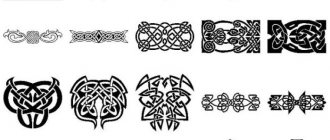The meaning of "out caesar out nihil"
Lexical meaning: definition
A common vocabulary (from the Greek Lexikos) is a set of all the basic semantic units of one language. The lexical meaning of a word reveals a common idea of an object, property, action, feeling, abstract phenomenon, effect, event, and the like. In other words, it determines what a given concept denotes in the mass consciousness. As soon as an unknown phenomenon acquires clarity, concrete attributes, or the awareness of the object arises, people assign it a name (a sound-letter shell), or more precisely, a lexical meaning. It then enters the dictionary of definitions with an interpretation of the content.
Dictionaries online for free - discovering new things
There are so many words and highly specialized terms in every language that it is simply unrealistic to know all their interpretations. In the modern world there are a lot of thematic directories, encyclopedias, thesauruses and glossaries. Let's run through their varieties:
- Explanatory Find the meaning of a word you can in the explanatory dictionary of the Russian language. Each explanatory "article" interpreter interprets the concept you are looking for in your native language, and considers its usage in the content. (PS: You will read even more instances of word usage, but without explanations, in the National Corpus of the Russian language. This is the most comprehensive database of written and spoken texts of native speech). Under the authorship of Dahl V.I., Ozhegov S.I., Ushakov D.N. the most famous thesauruses with interpretations of semantics in our country are issued. Their only disadvantage is that the editions are old, so the lexical composition is not replenished.
- Encyclopedic In contrast to explanatory dictionaries, academic and encyclopedic online dictionaries provide more complete, detailed explanations of meaning. Large encyclopedic editions contain information about historical events, personalities, cultural aspects, and artifacts. Encyclopedia articles tell about the realities of the past and broaden the mind. They can be universal or thematic, designed for a specific audience of users. For example, "Lexicon of financial terms," "Encyclopedia of housework," "Philosophy. Encyclopedic glossary", "Encyclopedia of fashion and clothes", multilingual universal online encyclopedia "Wikipedia".
- Industry These glossaries are designed for specialists of a particular profile. Their purpose is to explain professional terms, the interpretive meaning of specific concepts of a narrow sphere, branches of science, business, industry. They are published in the form of a glossary, a terminological reference book or a scientific reference book ("Thesaurus on Advertising, Marketing and PR", "Legal Reference Book", "Terminology of the Ministry of Emergency Situations").
- Etymological and borrowing Etymological Dictionary is a linguistic encyclopedia. In it you will read versions of the origin of lexical meanings, from what a word was formed (native, borrowed), its morphemic composition, semasiology, time of appearance, historical changes, analysis. The lexicographer will establish where the lexicon was borrowed from, consider subsequent semantic enrichments in the group of related word forms, as well as the sphere of functioning. He will give the variants of usage in conversation. As an example, etymological and lexical analysis of the concept "family name": borrowed from Latin (familia), where it meant a family nest, family, household members. Since the 18th century, it has been used as a second personal name (inherited). It enters the active lexicon. The etymological dictionary also explains the origin of the subtext of winged phrases, phraseological expressions. Let us comment on the stable expression "genuine truth". It is interpreted as the essential truth, the absolute truth. You won't believe it, an etymological analysis revealed that this idiom originated from the method of medieval torture. The defendant was beaten with a whip with a knot tied at the end, which was called a "ling." Under the ling, the man gave away everything frankly, the under-the-truth.
- Glossaries of obsolete vocabulary What is the difference between archaisms and historicisms? Some items consistently fall out of use. And then the lexical definitions of the items go out of use. Vocabulary that describes phenomena and objects that have disappeared from life are classified as historicisms. Examples of historicisms: camisole, musket, tsar, khan, baklushi, politruk, clerk, moshna, kokoshnik, khaldei, volost and others. You can find out the meaning of words that are no longer used in oral speech from collections of obsolete phrases. Archaisms are the words that have preserved the essence, changing the terminology: poet - poet, chelo - forehead, one-pointed coin - ruble, overseas - foreign, fortification - fortress, zemsky - national, tsvibak - biscuit cake, cookie. In other words, they were replaced by synonyms that are more relevant in today's reality. This category also includes Old Slavic words: hailstones (starosl.) - city (rus.), chado - child, vrata - gates, fingers - fingers, lips - lips, vluchatsya - to drag feet. Archaisms are found in the turnover of writers, poets, in pseudo-historical and fantasy films.
- Translation, foreign Bilingual Dictionaries for translating texts and words from one language to another. English-Russian, Spanish, German, French and others.
- Phraseological collection Phraseological expressions are lexically stable expressions, with an unarticulated structure and certain connotations. They include proverbs, proverbs, idioms, winged expressions, and aphorisms. Some of the word combinations are derived from legends and myths. They give literary language an artistic expressiveness. Phraseological expressions are usually used in figurative sense. Substitution of any component, rearrangement or breakage of a phrase leads to a speech error, unrecognized subtext of the phrase, distortion of the essence when translated into other languages. Find the figurative meaning of such expressions in the phrasebook. Examples of phraseology: "In the seventh heaven", "A mosquito won't shake his nose", "Blue blood", "Devil's advocate", "Burn bridges", "Polichinelle's secret", "Like a peep", "Dust in the eyes", "Work with your hands down", "The Sword of Damocles", "Gifts of the Danites", "Two-edged sticks", "The apple of discord", "Warm your hands", "Sisyphus' work", "Climb the wall", "Keep your ear to the ground", "Throwing beads before swine", "A little bit of it", "A sparrow", "An Abyssinian stable", "A Calif for an hour", "A headache", "A heart to feed", "Clap your ears", "Achilles' heel", "I've eaten my dog", "Like water off a duck's back", "Grasp at straws", "Build castles in the air", "Be in the trend", "Live like a cheese in butter".
- Defining Neologisms Language change is stimulated by dynamic life. Mankind strives for development, simplification of life, innovation, and this contributes to the appearance of new things, technology. Neologisms are lexical expressions of unfamiliar objects, new realities in people's lives, appeared concepts, phenomena. For example, what "barista" means is the profession of a coffee brewer; a coffee professional who understands the varieties of coffee beans and is able to beautifully decorate the steaming cups with the drink before serving it to the client. Every word was once a neologism, until it became common and entered the active vocabulary of the literary language. Many of them disappear before they are even in active use. Neologisms can be word-formation, i.e. absolutely newly formed (including from Anglicisms), and semantic. Semantic neologisms include already known lexical concepts endowed with fresh content, for example "pirate" is not only a sea corsair, but also a copyright infringer, a user of torrent resources. Here are just a few instances of word-derived neologisms: "hypehack, meme, google, flash mob, casting director, pre-production, copywriting, franking, propagate, manimaker, screener, freelancing, headliner, blogger, downshifting, fake, brandalism. Another option, "copyist" is a content owner or ardent supporter of intellectual rights.
- Other 177+ In addition to those listed, there are thesauruses: linguistic, on various areas of linguistics; dialectal; linguocountry study; grammatical; linguistic terms; eponyms; transcripts of abbreviations; tourist's lexicon; slang. Students will benefit from lexical dictionaries with synonyms, antonyms, homonyms, paronyms, and instructional dictionaries: spelling, punctuation, word formation, morphemic. Orthoepic reference book for correct pronunciation (phonetics). Toponymic reference dictionaries contain geographical information on regions and names. In anthroponymic - data on proper names, surnames, nicknames.
Interpreting words online: the shortest way to knowledge
It is easier to express yourself, to express your thoughts concretely and more concisely, to enliven your speech - all this is possible with an expanded vocabulary. With How to all, you can define the meaning of words online, find related synonyms, and expand your vocabulary. It is easy to make up for the last point by reading fiction. You will become a more erudite interesting conversationalist and maintain conversation on a variety of topics. Literary writers and writers will find it useful to find out what words from, say, the Middle Ages or a philosophical glossary mean in order to warm up the internal generator of ideas.
Globalization is taking its toll. It's having an effect on writing. It has become fashionable to write in Cyrillic and Latin, without transliteration: SPA-salon, fashion-industry, GPS-navigator, Hi-Fi or High End acoustics, Hi-Tech electronics. To correctly interpret the content of hybrid words, switch between keyboard layouts. Let your speech break stereotypes. Texts stir the senses, spill an elixir on the soul, and have no time limit. Good luck with your creative experiments!
The how-to-all.com project is evolving and being updated with up-to-date dictionaries with real-time vocabulary. Stay tuned for updates. This site helps you to speak and write Russian correctly. Tell everyone who is studying at uni, school, preparing for the Unified State Exam, writing texts, studying Russian, about us.
Phrases in Latin for tattoos
Latin is considered an ancient language, but this does not prevent it from possessing the charm inherent in many other languages. Only a few people speak Latin today, so it has a charm and mystique that can serve as a thread that connects a person to their tattoo. We can trace the origin of some famous phrases, inscriptions, and philosophical quotations. Many celebrities have "immortalized" on their bodies their thoughts in Latin in the form of inscriptions. Here is a list of ideas that may come in handy if you plan to do yourself Tattoo with an inscription.
Castigat Ridendo Mores. - Punish the ridiculous by joking.
Aut Viam Inveniam Aut Faciam - Either find a way, or make one yourself.
Non Omnis Moriar - Nay, all I will not die
Ab altero expectes, alteri quod feceris - Expect from another what you yourself have done to another.
Abiens, abi! - Going away, go away!
Adversa fortuna - Evil Fate.
Aequam memento rebus in arduis servare mentem - Try to keep your spirits even in difficult circumstances.
Aetate fruere, mobili cursu fugit - Take advantage of life, it is so fleeting.
Actum ne agas - What is done, do not return.
Aliena vitia in oculis habemus, and tergo nostra sunt - Other people's vices are in front of our eyes, ours behind our backs.
Aliis inserviendo consumor - Serving others I waste myself. (The inscription under the candle as a symbol of self-sacrifice, given in numerous editions of collections of symbols and emblems.)
Amantes sunt amentes. - Lovers are insane.
Amicos res secundae parant, adversae probant - Friends are created by happiness, unhappiness tests them.
Amor etiam deos tangit - Even gods are subject to love.
Amor non est medicabilis herbis - Love is not cured by herbs. (i.e., there is no cure for love. Ovid, The Heroides)
Amor omnia vincit - Love conquers all.
Amor, ut lacrima, ab oculo oritur, in cor cadit - Love, like a tear, is born from the eyes, falls on the heart. Antiquus amor cancer est - Old love is not forgotten.
Audi, multa, loquere pauca. - Hear much, speak little.
Audi, vide, sile - Listen, watch, and keep quiet.
Audire ignoti quom imperant soleo non auscultare - I am ready to listen to nonsense, but I will not obey.
Aut viam inveniam, aut faciam - Either I will find the way, or I will make it myself.
Aut vincere, aut mori - Either to conquer or to die.
Aut caesar, aut nihil. - Or Caesar, or nothing.
Audaces fortuna juvat - Fortune favors the bold.
Cave! - Be careful!
Contra spem spero. - Without hope hope.
Cum deo. - With God.
Debellare superbos. - To suppress the proud, the rebellious.
Dictum factum. - Said is done.
Ergage humanum est - It is inherent in man to make mistakes.
Est quaedam flere voluptas - There is something of pleasure in tears.
Faciam ut mei memineris - I will make you remember me!
Fatum - Fate, doom.
Finis coronat opus - The end crowns the deed.
Fortes fortuna adjuvat - Fate helps the brave.
Gaudeamus igitur, juvenes dum sumus - Let us have fun while we are young.
Gutta cavat lapidem - A drop chisels a stone.
Naes fac ut felix vivas - Do this to live happily.
Hoc est in votis - This is what I want.
Homo homini lupus est - Man is a wolf to man.
Homo liber. - A free man.
Homo res sacra. - Man is a sacred thing.
Ignoti NULLa cupido - What they don't know, they don't want.
In hac spe vivo - This is the hope that I live by.
In vino veritas - The truth is in the wine.
Juravi lingua, mentem injuratam gero - I swear by tongue, but not by thought.
Jus vitae as necis. - The right to dispose of life and death.
Magna res est amor. - Great deed is love.
Malo mori quam foedari - Better death than dishonor.
Malum necessarium - necessarium. - Unavoidable evil is inevitable.
Memento mori. - Remember death!
Memento quod es homo. - Remember that you are human.
Me quoque fata regunt - I, too, obey fate.
Mortem effugere nemo potest - No one shall escape death.
Ne cede malis - Do not lose heart in adversity.
Nil inultum remanebit. - Nothing will remain unredeemed.
Noli me tangere - Touch me not.
Oderint, dum metuant - Let them hate, but be afraid.
Omnia mea mecum porto - All that is mine I carry with me.
Omnia vanitas - All is vanity!
Per aspera ad astra - Through thorns to the stars.
Pisces natare oportet - A fish must swim.
Potius sero quam nunquam - Better late than never.
Procul negotiis. - Away with trouble.
Qui sine peccato est. - He who is without sin.
Quod licet Jovi, non licet bovi. - What Jupiter can do, the bull can't do.
Quod principi placuit, legis habet vigorem - What pleases the lord has the force of law.
Requiescit in pace - Requiescit in pace.
Sic itur ad astra. - Thus go to the stars.
Sic volo. - That's the way I want it.
Silentium - Silence.
Supremum vale. - Last pardon.
Suum cuique. - To each his own.
Trahit sua quemque voluptas - Everyone is drawn by his passion.
Tu ne cede malis, sed contra audentior ito - Do not submit to misfortune, but bravely face it.
Ubi bene, ibi patria - Where there is good, there is homeland.
Unam in armis salutem. - The only salvation is in the struggle.
Vale et me ama. - Farewell and love me.
Veni, vidi, vici - Came, saw, conquered.
Via sacra - The sacred way.
Vita sene libertate nlhil - Life without freedom is nothing.
Vivere militare est. - To live is to fight.











